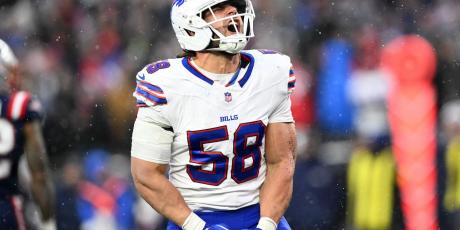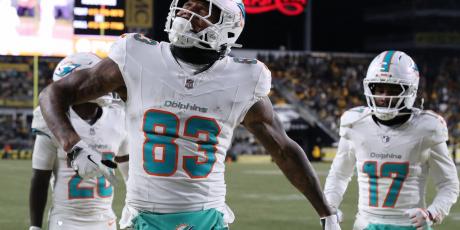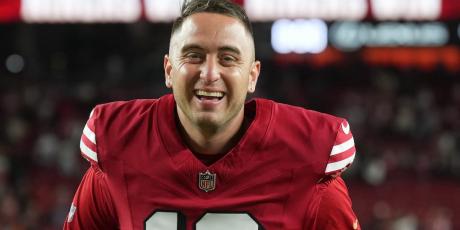Coach Tom Bass Tackles Your Questions

Let's say a game looks fairly close -- say one team is 6-4 and they travel to the 5-5 team's stadium. Over hundreds of games, how much is luck the deciding factor? And if luck isn't the biggest factor what usually is? The offense, the defense, the coach, the QB, special teams?
Coaches often talk between themselves of having or not having the "Football Fairy" on their side. Winning teams will talk openly about being lucky during a particular game.
In reality it is often the team with the best game plan [the coaches], the most poise [the players] and the most breaks [the officials] that will influence the outcome of a really close game.
Once the game starts, you can call it luck when something good happens in any one of the three areas. In reality it is preparation in the first two areas that will determine how lucky you are in a game and if the "Football Fairy" is on your sideline.
Some areas that I always liked to check to prepare in addition to normal tendencies were: play calling at crunch time [who and what were the goals] and of course the officiating crew [did they have tendencies to call a certain type of penalty].
Coach, please help me learn how to best evaluate a RB for my keeper league.
I would think that it is very important to try to find a player who has the ability to move the ball by both running and receiving.
He must be durable and hopefully be on a team that consistently runs 70 to 80 offensive plays a game.
Try to find a running back that is on a team where the offensive coordinator is not just thinking about passing the ball to make a name for himself and the running game is relegated to 1 and 10 and short yardage situations.
It would be beneficial to have your running back in the game on goal line offense as well as third and long so his scoring chances increase.
Let's say two RBs are both age 24. One RB has had 1,000 carries and the other only 300. If the two are otherwise equal, should I devalue the RB with all those extra carries? Will that hurt him over the next 2-5 years or is that just not true?
Unfortunately in this situation the two are not going to be equal.
One player has seen the defenses react, has seen the holes open and disappear and has found out first hand who the tacklers are on the opposing side of the ball 700 more times than the other player.
I guess the question we should be looking at "Is experience more important than freshness in a running back?"
Assuming neither player has had major injuries, I would be inclined to take the experienced back if I had to pick one over the other for this year. If we were asked to project out five years from now, the amount of carries and the corresponding amount of pounding would be of greater concern and influence my decision.
In answering any question like this, it is always important to remember that the number one consideration must be the individual player that we are talking about.
While the average playing time for running backs is a little over 4 years, great backs like Marcus Allen, Walter Payton and many others continued to perform at a high level for many more years.
I know an NFL coaching staff has a much bigger impact than a baseball manager on his team's success. In baseball what can the coach really do, say hit the ball hard and over the fence each time (95% of the time)? Okay, but do NFL coaches really make that big of a difference in the game?
Good NFL coaches do make a big difference in the outcome of the game.
First they are great teachers and have the ability to communicate ideas and techniques to their players in a manner that is easily understood.
Starting with the Head Coach, a good coaching staff sets an atmosphere for the team where learning can take place, where routine is established and where players feel a comfort level and look forward to coming to work each day.
It is during the game that the great coaches step forward. It may be a coach like Don Coryell who instantly saw something on the field and introduced a special play that worked. Or it can be a coach up in the press box who has the ability to come down at half time with exact information on your opponent's adjustments in the first two quarters and suggests plays and changes that you might need to make to be successful.
NFL coaches do have a great deal of input and influence during the game that can actually determine the ultimate winner of the contest.
If a team has a really great defense, will that team's offense play more aggressive or less aggressive or doesn't it matter? It always seems like the good defensive teams have a below average offense.
Obviously what we would all like to have is a nice balance between our offense and defense.
In reality many head coaches who have a great defense begin to think in terms of not putting the defense in a disadvantageous position.
The idea is that if the other team does not score, you cannot lose the game. With this thinking the offense becomes content to play for field position, seldom taking offensive chances, running the ball more or throwing short passes and relying on the kicking game to move the ball and to score points.
Today, with 32 teams playing the game, it is very difficult to field a really strong offensive and defensive team. Usually the emphasis and the performance level will be on one side of the ball or on the other and very seldom on both.
Coach Bass I understand you worked with Don Coryell. Coach Coryell really liked to pass and is considered a great offensive mind for passing. But, if you had a great running back like Adrian Peterson or MJD would you have run more? How much more? I know it's a balancing act, but do players fit the system or does the system get formed by the type of players you have? So, if a great hard-nosed runner lands on a pass-happy team, what would happen?
Many people remember that Don had Dan Fouts, Joiner, J.J., and Kellen but they forget that the Chargers also featured great running backs like James Brooks and Chuck Muncie.
Good coaches find a way to make the system fit the players that they have at their use for the season.
If a great runner is added to a team that has outstanding success throwing the ball, the coach may be happy to feature more running.
The challenge will be to get the quarterback and the receivers to accept and be enthusiastic about the change in play calling. Sometimes this can become a very difficult adjustment and can lead to unrest and second-guessing by the players, especially if the offensive scoring has an initial drop.
On defense, how do you go about slowing down a team's best receiver? If you focus on a given receiver, who on his offense benefits the most - RB, other WR, a TE, etc?
On defense we have a few options. First, we can double the receiver, assign two defensive backs to cover him either short and long or in and out. Next, we can roll up on the receiver, get a hit on him and try to disrupt his pattern and the timing of the pass between the quarterback and the receiver.
We can also assign one defensive player to move up into press coverage and run with the receiver all over the field while the rest of the team plays zone or man-to-man pass defense.
The receiver that benefits most when a defense sets out to take a top receiver out of the game will often be the next receiver to the inside.
In a normal formation, if the star is the flanker, the tight end will emerge. If it is the split end, it will be the running back that benefits the most. When the star is the outside receiver on a two wide receiver set to one side of the ball, it will usually be the slot man who has the potential for a big day.












